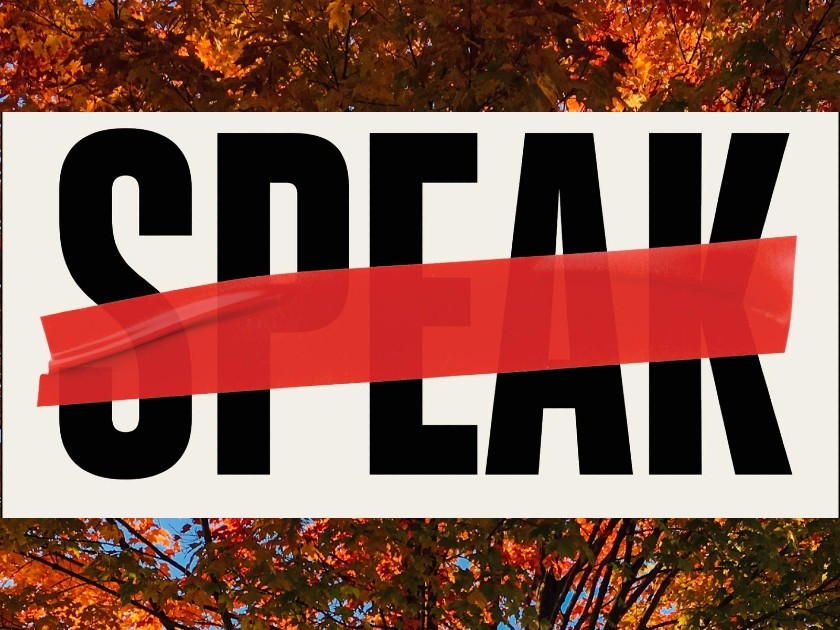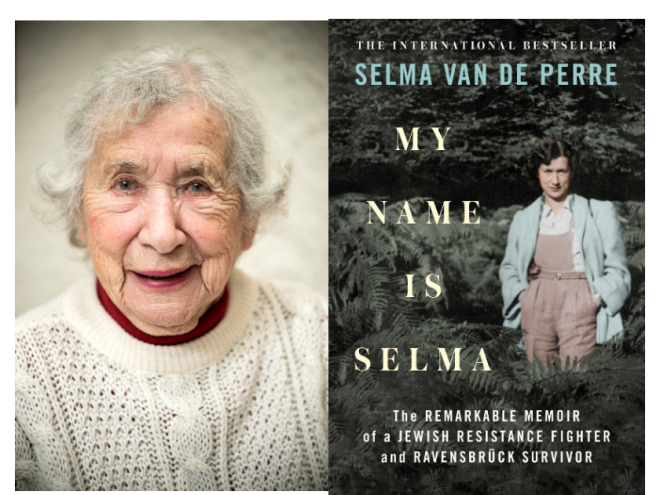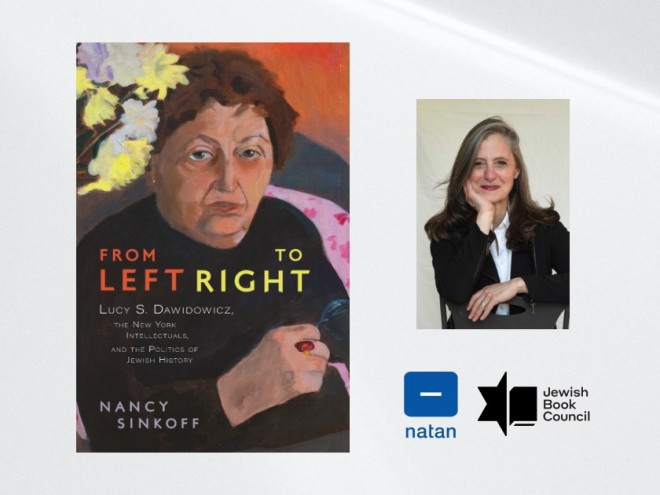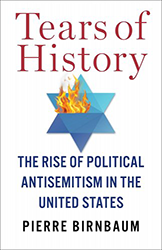
Image cropped from Dare to Speak by Suzanne Nossel
Rabbi Marc Katz spoke with the CEO of PEN America Suzanne Nossel on her new book Dare To Speak: Defending Free Speech for All, discussing the nuances of unfettered speech and its relationship to Jewish values .
Marc Katz: You have spent many hours thinking about free speech as the CEO of PEN America. Why has this issue struck a chord for you? Why have you dedicated your life to it, and what role did your Judaism play in your decision to pursue this issue?
Suzanne Nossel: I trace my career in the human rights field to my Jewish background. I grew up in a family of Holocaust escapees and victims, and my early education focused heavily on studying Nazi Germany and the extermination. As a child, I took part in the movement to free Soviet Jewry from persecution. The feeling of standing up with others, marching down to Dag Hammarskjold Plaza, and shouting the names of individuals who were targeted and imprisoned for practicing their religion and speaking their minds was very powerful. I later focused my undergraduate thesis on a study of the Jewish community in Birmingham, Alabama, and their response to integration and the civil rights movement, interrogating the complexities of holding both privilege and vulnerability at a moment of reckoning against bias and bigotry. While I don’t think Judaism has all the answers, it offers a platform to raise many of the questions that I have found most compelling to explore in my career. In terms of free speech, I view it as the underpinning of all other rights — in that if your expressive freedom is denied, you cannot advocate or drive forward change to realize and safeguard other liberties.
MK: Why write a book now about it? What about this time calls for you to take this message to a wider audience than those that follow PEN America?
SN: The impetus for writing my book grew out of many discussions I have had in the course of my work at PEN America with young people who have grown increasingly skeptical of free speech, seeing it as a smokescreen that hides hatefulness, vitriol, and slurs. I worry about a rising generation losing faith in the ideals of free speech. At the same time, I think some free speech defenders can be excessively dismissive of those who point out the contradictions that can arise between the drive for a more equal, inclusive society, and robust protections for free speech. I think those conflicts can be genuine and serious and that by far the better approach, rather than to ridicule or caricature concerns for the harmful impact of some speech, is to engage with those who raise the issue and explain why free speech protections ultimately help safeguard the most vulnerable.
MK: According to our ancient rabbis, good discourse should be like “iron sharpening iron” since both sides of a dispute get sharper in the process. Why is open discourse important? And when it works well, what does it look like?
SN: One of the traditional rationales underpinning the ideal of free speech is the notion that it helps to uncover the best ideas, the truth, and new, important innovations. The notion is that by bumping up against each other, viewpoints and opinions are analyzed, re-evaluated, honed, and refined in ways that help heighten accuracy, clarity, and insight. If the discourse is constricted, not everyone can participate; some people feel inhibited, certain views are barred from being aired, the forum is skewed by grave imbalances of power or money, there is resort to ad hominem attacks — that process is impaired, and the risk increased that faulty notions win the day because they have not been fully contested. When it works well there are multiple voices weighing in — things can get heated — but there is a willingness from different sides of the argument to engage one another on the merits with facts, evidence, theories, and points that force participants in the debate to think and consider. There has to be some openness to persuasion, which is increasingly what seems to have disappeared in our politics.
One of the traditional rationales underpinning the ideal of free speech is the notion that it helps to uncover the best ideas, the truth, and new, important innovations.
MK: At the same time, they also write that “he who whitens the face of another [by shaming him], it is as if he has shed their blood.” What should the limits of speech be? When can we curtail free speech in order to protect others physical or emotional wellbeing?
SN: I argue in Dare to Speak that a critical element in terms of protecting free speech rights in our diverse society lies in voluntary restraint. None of us says everything that comes to mind — we have filters that operate based on how we want to be regarded; the sensitivities of those around us, our tolerance for conflict, and all sorts of other factors. Free speech has never meant that we renounce all discretion in what we say. I argue that we are all obligated to exercise conscientiousness with language, which is a cognizance of our audience and their sensitivities. For those in positions of power or who hold large platforms — such as a professor, a politician or a talk show host — I believe the duty of care we must exercise in speaking out is greater. If we adhered to those principles, we could avoid a lot of inadvertent offenses — outdated terms to refer to particular groups, invocations of stereotypes or sexist phrasings, for example. That doesn’t resolve the questions that arise when someone intentionally voices an opinion that others consider offensive. In my view, if reasonable steps have been taken to minimize hurt and harm there must be space for the airing of viewpoints that may cause others discomfort, unease, or even a measure of psychological harm. The First Amendment allows for restrictions in cases where such harms are severe — for example, harassment or threats — but protects speech that causes upset short of that. Given the subjectivities involved in adjudicating such harms, I think we are better off with strict limits on how far the government can go in banning and punishing speech on the basis that it has caused offense. If it were up to President Trump and the First Amendment did not constrain him, it’s easy to imagine how he would further invoke the power of government to punish his critics, something he’s repeatedly attempted notwithstanding the Constitution.
MK: To zero in on one specific issue of this tension, you write a whole chapter on “cancel culture” in your book. As we know, an action like boycotting has been a tool used by the less powerful to speak truth to power. The civil rights movement is a great example of this. What place does “cancel culture” have in our society today? And when does it go too far?
SN: Cancel culture is an almost uselessly elastic term that can refer to everything from the cultural shunning of individuals like Harvey Weinstein or Bill Cosby who have committed grave crimes, to calls to punish or boycott professors because they were spotted at a protest in support of police — an incident that happened at Skidmore College earlier this year. I think there are situations where stigma and distancing may be warranted on the basis of speech, if someone has expressed odious views, is known for bigoted comments, or is otherwise willfully causing offense. Others are within their rights to ostracize that individual and signal that the views are unacceptable. The problem is that the impulse to excommunicate individuals is not always on the basis of justifiable grounds. There are many instances in which a single errant comment or tweet becomes the basis for calls for institutional punishment. If universities, employers, or institutions are empowered to discipline or remove someone based on a single comment, there is a real risk that such power is misused to target those who challenge their authority. So, while there are some people who deserve to be cancelled, such calls should be limited to extreme cases.
MK: One of the most famous free speech cases in all of American history happened when a group of neo-nazis in 1977 sought to march in Skokie, Illinois, home to a large group of Holocaust survivors. Why do you think this event stuck out in the American consciousness? And how has the world changed since then?
SN: It was a challenging case, in that it pitted values of free speech against the very understandable sensitivities of a community that included many Holocaust survivors and descendants, illustrating the tensions that can arise in trying to balance the importance of respecting individual dignity and wellbeing with robust protections for even noxious speech. The ACLU was criticized for supporting the Nazis in their quest to march, but the organization ultimately won itself enormous legitimacy by demonstrating that it was prepared to apply its principles even in relation to a cause that most of its members found abhorrent. While they lost donors and members in the short term I think it ultimately strengthened their reputation. One thing people forget is that, after all the fuss, the Nazis never held their march. The name of the game of these provocateurs is to elicit outrage over being silenced. Once that strategy failed, the expressive acts that they once made out to be so urgent lost steam.
MK: I love your section on forgiveness. In fact I made it the cornerstone of my Yom Kippur Sermon. I’m curious if there is ever enough time for certain individuals to earn forgiveness. For example, can Harvey Weinstein or even Louis CK ever come back from what they did?
SN: I made a distinction between speech and other sorts of acts, including the sorts of crimes for which Harvey Weinstein is now in jail. My book is concerned with forgiveness for speech that wounds or offends. I argue that listeners need to take into account intent and context when evaluating how to respond to speech, and cite instances — including the case of a high school teacher who said “Heil Hitler” and gave the Nazi salute in class — in which even speech that appears on its face to be contemptible and culpable may actually be innocent once the motives and circumstances have been interrogated. I argue that there should be paths to forgiveness for speech blunders, and even willful offenses. If people are genuinely contrite, willing to recognize and admit what they’ve done wrong, and reach out to those who were hurt then there should be a path to forgiveness.
I argue that there should be paths to forgiveness for speech blunders, and even willful offenses.
MK: You speak thoughtfully about avoiding “caricaturing free speech debates.” For those who haven’t read the book, what are some of the major “caricatures” that we often attribute to defenders and objectors of certain speech. And how can we add more nuance into the conversation?
SN: On the right there is a tendency to mock concerns over offensive speech, such as the whining of cosseted snowflakes who have been raised at the hands of overprotective, “helicopter” parents who have failed to cultivate resilience, and instead raised a generation of adults who cower in the face of anything that upsets them. Those on the left can demonize free speech defenders as bigoted, callous, and clueless. Derisive terms like “OK Boomer” and Karen can be used to dismiss points of view that deserve a hearing. The battles are often drawn along generational lines, with both younger and older cohorts tending to regard one another as hopelessly deluded or out of touch. Having spent a lot of time engaging in these debates, I know that there is some validity to the points being made on all sides and, if you can get past the caricatures, there is scope for older people to understand why a rising generation thinks that more must be done to curb hateful speech and for younger people to recognize that empowering government or other authorities to police speech more aggressively can backfire against the causes they are seeking to advance.
MK: You explain towards the end of the book that legally, speech falls under the category of incitement if it advocates imminent and likely lawbreaking. However, earlier you speak about the desire of many to label speech as “violence.” Do you think it’s good that the law has such a narrow definition? And should we, as a society, come closer to matching it when seeking to limit free speech?
SN: The US definition of incitement is narrower than that of just about any jurisdiction in the world, in that its limited to incitement only to imminent violence, as opposed to incitement to hatred or discrimination, which are much more nebulous concepts. I support this strict definition, in that there is all sorts of speech that could be construed as incitement to discrimination — for example, talk of differences between men and women, or discussions of cultural or religious practices — that I do not think should be outlawed. I do not subscribe to the idea that all institutions of society — for example employers, schools, or social media platforms — should mediate speech only so far as it falls outside the bounds of First Amendment protection. I think those institutions have the right to police speech based on broader criteria — for example, rejecting bullying or disinformation even under circumstances where the law would treat it as protected speech. It’s also clear that, online in particular, speech can be weaponized to inflict substantial harms.
MK: Late last year, Sacha Baron Cohen made a splash at the ADL when he spoke about tech companies’ role in promoting antisemitism by failing to limit hate speech. You write about the need to hold these companies accountable with similar passion. Why do you think this is such an important task?
SN: I talk about two sides of the coin — why we should not afford social media platforms unfettered power to police speech and, at the same time, why we must hold them accountable for harms they enable. So much of our discourse now takes place on social media and a majority of Americans derive most of their news and information from these online platforms. So the nature of the debate, the reliability of what we read and the tenor of the discussions has a huge effect on society at large. Also, the platforms are not simply neutral bulletin boards for what individuals choose to express. Their algorithms put a premium on eye-catching, outlandish, and even incendiary content, meaning that the medium has a direct impact on the message, and can amplify speech that is hateful, accusatory, polarizing or otherwise inflammatory. I think platforms bear particular accountability for the ways in which their technologies and business models privilege certain kinds of speech, and the ripple effects that they can have; for example, oxygenating conspiracy theories that would otherwise dry up due to lack of air and interest. I do think that as platforms become more aggressive in policing speech, we need to ensure that they enact proper failsafes to ensure that they are not overly restrictive in taking whole subjects off limits for discussion or privileging the speech of certain groups over that of others.
MK: What is the unique role of the Jewish community in fostering free speech? How do we sometimes get in our own way?
SN: I do see free speech as integral to Jewish values of inquiry, intellectual curiosity, education, and debate. The rabbinic emphasis on elucidating varied analyses of the Talmud and embracing multiple interpretations and points of view is consistent with the underlying rationale for protecting free speech — which is that it serves as a catalyst for truth, understanding, creativity, progress, innovation, and other societal goods. At times, the defense of free speech can be pitted against the drive to combat antisemitism; for example, through laws that advocate punishing those who support BDS. We are witnessing a spike in antisemitic expression and actions, which is genuinely alarming. But I don’t think it should be — or can effectively be — combatted through restrictions on speech. It’s one thing to oppose BDS, but another to suggest that those who favor it should be punished for holding or expressing that view. The search for special protections against speech considered antisemitic opens the door for commensurate restrictions on speech that is offensive or objectionable to other religions and ethnic groups. If every group were to seek to ban speech that they consider objectionable or potentially imperiling, entire subject matters would be taken off-limits from our public dialogue. In the course of PEN America’s work on college campuses we have come across censoriousness on both sides of the debate over Israel and Palestine. And yet, if we acceded to that, the whole subject would be off the table, impairing important discussions on how to achieve peace and human rights for all.
MK: I’m writing you these questions as I’m putting finishing touches on a number of High Holy Day sermons. As a Rabbi, free speech (and freedom of the pulpit), are cornerstones in my work. What advice do you have for people in similar positions, navigating the challenges of speaking freely?
SN: My book offers a series of principles to consider when speaking, including the idea that we should use language conscientiously, being mindful of who is in the audience and how they may interpret what we say. I also argue that when you have a large platform —for example a rabbinic pulpit — you owe a special duty of care to think through your message and avoid inadvertent offenses or lapses that result from insufficient forethought, or not taking the time to solicit input from others who can help ensure that you are getting across what you intended. I also argue that it’s important to find ways to discuss even controversial topics and that, with enough research, marshalling of facts and taking account of potential counter-arguments, it is possible to broach even highly sensitive topics thoughtfully and responsibly.
Rabbi Marc Katz is the Rabbi at Temple Ner Tamid in Bloomfield, NJ. He is author of the book The Heart of Loneliness: How Jewish Wisdom Can Help You Cope and Find Comfort (Turner Publishing), which was chosen as a finalist for the National Jewish Book Award.



